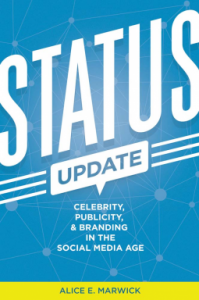 I thought this book would be more about status updated with just Twitter and Facebook but I was pleasantly surprised (or maybe i should read book blurbs better) that it focused more on all sorts of technology and connecting to people – blogs, usenet, the way sxsw is ahead of the curve with debuting new technology. (Usenet is how I met most of my internet friends as a teen because I never had many friends IRL). Interesting also is the ‘anti-fan’, a group of people who love to hate something and will comment negatively on anything the person they are an ‘anti-fan’ of posts. Who has the time for that?
I thought this book would be more about status updated with just Twitter and Facebook but I was pleasantly surprised (or maybe i should read book blurbs better) that it focused more on all sorts of technology and connecting to people – blogs, usenet, the way sxsw is ahead of the curve with debuting new technology. (Usenet is how I met most of my internet friends as a teen because I never had many friends IRL). Interesting also is the ‘anti-fan’, a group of people who love to hate something and will comment negatively on anything the person they are an ‘anti-fan’ of posts. Who has the time for that?
The book certainly gave me a lot to think about in terms of status and being a ‘micro-celebrity’ not that I think I am one – but hey, a girl can dream, right? Maybe some day “concert katie” will be a household name?
If you are into technology, status and social media as much as I am then you will probably want to check out this book (Or if you have no friends IRL – or does that just go hand in hand?) It has a lot of great info and resources and you will hopefully, as I did, learn a lot!
I received a free e-copy of this book in order to write this review. I was not otherwise compensated.
About the Book
Social media technologies such as YouTube, Twitter, and Facebook promised a new participatory online culture. Yet, technology insider Alice Marwick contends in this insightful book, “Web 2.0” only encouraged a preoccupation with status and attention. Her original research—which includes conversations with entrepreneurs, Internet celebrities, and Silicon Valley journalists—explores the culture and ideology of San Francisco’s tech community in the period between the dot com boom and the App store, when the city was the world’s center of social media development. Marwick argues that early revolutionary goals have failed to materialize: while many continue to view social media as democratic, these technologies instead turn users into marketers and self-promoters, and leave technology companies poised to violate privacy and to prioritize profits over participation. Marwick analyzes status-building techniques—such as self-branding, micro-celebrity, and life-streaming—to show that Web 2.0 did not provide a cultural revolution, but only furthered inequality and reinforced traditional social stratification, demarcated by race, class, and gender.